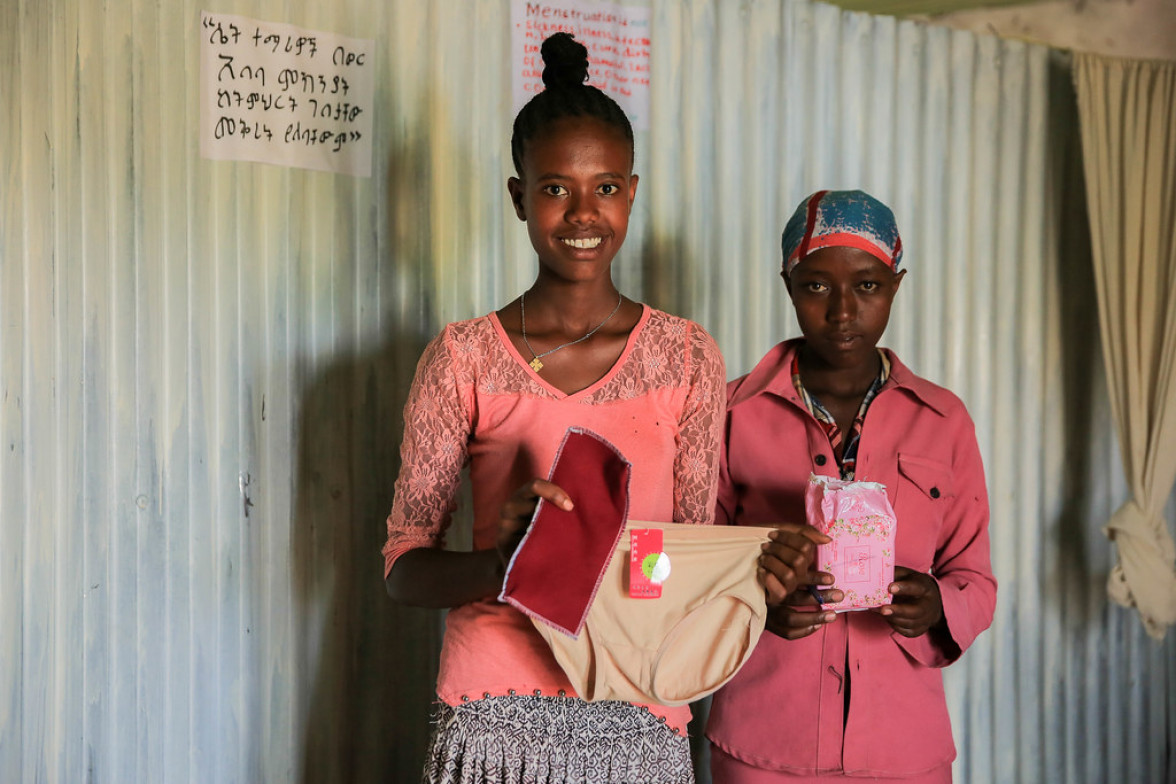
Why We Should Normalize Menstruation Talk

Written by: Phit Phariya, a 4th year student majoring in International Studies at The Royal University of Phnom Penh
Edited by: Sao Phal Niseiy, Editor-in-Chief at The Cambodianess and Deputy Editor-in-Chief at Thmey Thmey News

(Photo Credit: "Students in Kara Molla Primary School holding products for menstruation hygiene." by UNICEF Ethiopia is licensed under CC BY-NC-ND 2.0)
Why do menstrual issues need to be discussed? Why do we have to care about menstrual well-being, and why should it be normalized? Here is as good as the time to converse on social stigma over the period taboo. Imagine if people everywhere can freely talk and are knowledgeable about period cycles and situations without any shames. They will understand that there is nothing dirty or impure when it comes to monthly bleeding. It is because a period is a normal and healthy aspect of women's reproductive health, which is natural and good.
“Excuse me, can you help check out my back pant, is it stained with my period blood?” whispers a woman.
This kind of situation happens to almost every woman and girl out there. What they experience is just as familiar as A Talk Around Women Cycle! As being constrained by the existing cultural norms and customs within our society, we find it completely uncomfortable to speak about it freely and publicly. But I think there are plenty of things we can discuss here, and let's explore!
Period shame hurts women!
Periods are no joke; the issue can have severe unintended consequences for women and girls as they can be ashamed and are unable to carry on with their daily lives in many parts of the world. The silence around menstruation has harmed girls because they feel embarrassed to talk about this issue. How many times have you heard this: “Oh she must be on period”?- Even just once is beyond annoying. It is insane that we are still thinking about the stigma of menstruation when it affects most women heavily, and I am not going to stand for that. We always feel uncomfortable when buying sanitary pads in public; it always has to be covered with a black plastic bag, and we always have to place it in the hidden place. Besides, in public places, we always whisper to our female mates when we happen to need a pad because we are always afraid that other boy mates would have heard of what we need. When girls at school are asked what will make getting their period smoother, they habitually respond: “wrappers.” Everywhere, girls are told from a young age to keep their period issue private, but is it not generally out of guilt that we keep things like this to ourselves? The social stigma over period issue invalidates women’s emotions because of premenstrual syndrome (PMS). It happens once our feelings are denied acknowledgement just in case they are period-related. With this, my point is that psychological validation matters to us, and it, of course, deserves greater attention, too. And what I want to emphasize is that we don't want our periods hidden as if it is a shameful secret, but we want a recognition that it is normal, healthy, and essential.
Lack of menstrual education in Cambodia
The menstrual taboo causes the limit of understanding among women and men in terms of period knowledge. During their cycles, some view women as being spoiled or defiled, and since mentioning periods is taboo, menstrual education is seriously deficient. It consequently upholds the unhealthy habit due to the phobic social norm of shame-ness and shyness to women out there. They are missing out, and they can suffer health implications as a consequence. Instead of educating women and girls on changing tampons every four hours as well as clean their private areas regularly, they commonly are told to avoid cold drinks, shower, sour foods, and fermented fish when they are on their periods. In the meantime, they should not drink ice water or coconut juice as it can block menstruation. These certain taboos remain despite their lack of scientific basis, which prevents them from following menstrual hygiene management. We have also grown up believing the menstruation issue should be secret as it is perceived as gross and unacceptable. But the absence of menstrual education and frequent open conversations on this issue can become a potential challenge to women's lifestyle anywhere. The menstrual cycle is a bodily function as normal as sweating. We should be grateful that our body works for us. Therefore, raising awareness of periods shamelessly and walking with confidence are maintaining our health and well-being.
We need to start normalizing period talk!
There is no shame for women and girls to talk and share experience on how our body works! Most of the time, when I share my period experience with other women, I always get a response: “I thought I was alone”. Girls are embarrassed even to talk about their menstrual problems with their family members, especially their dad, brother even with their female coworkers since women regard it as an inappropriate topic to raise. Embarrassment and mortification should not be a part of our menstrual experience, and a wider conversation about menstruation can help make people around us better understand the subject matter! Additionally, talking about periods is the most common thing to improve the quality and deepness of any relationship between those who have periods and others. The number of men who know about periods is still limited somehow, and this could lead to a misperception of menstruation. I experienced talking with a male mate that I am working on period-related things. He surprisingly responded, “Wah, I am not quite familiar with that stuff.” This indicates that an absence of period talk in our society is a culprit. Period talk is not just about women, but it is also about a concern for the environment and good hygiene for human beings. Most importantly, women can never be determined as weak by their menstrual bleeding. So, beginning to normalize menstruation conversation in our society is crucial to get rid of shame with confidence and enable other women and girls to unlock their full potential.
My suggestions on beginning normalization of period talk
There are some ways I would say we can do to support the normalization of period talk. To end menstruation stigma and taboo, discussing and sharing experiences about our menstrual cycle with our circles in everyday life should be carried out. Furthermore, we should be freely aware that there is nothing to be ashamed of as periods are natural, resilient, and liberated that our body is working for us accordingly. Apart from this, we should ensure the knowledge of menstruation in the school curriculum. Therefore, students, regardless of gender, can understand better about menstruation. This action contributes to the reduction of shame-ness and bullying as well as building supportiveness for women. In the meantime, teachers can educate students regarding menstrual and menstrual waste management. To support normalizing period talk, tampons, in addition to toilet paper, should be made available in public bathrooms so there will be no longer a feeling of shame and shyness over having a monthly period bleeding even without us knowing it. If women and girls do not live in a place where they can talk openly about their reproductive health concerns, this demonstrates gender inequality. We deserve love, kindness and also deserve to be treated like a goddess. We should feel blessed and worthy of this bleeding! And I stress an era of menstrual taboo is OVER!
*This blog is produced with the financial support from the European Union and The Swedish International Development Cooperation Agency through Transparency International Cambodia and ActionAid Cambodia. Its contents do not reflect the views of any donors.




